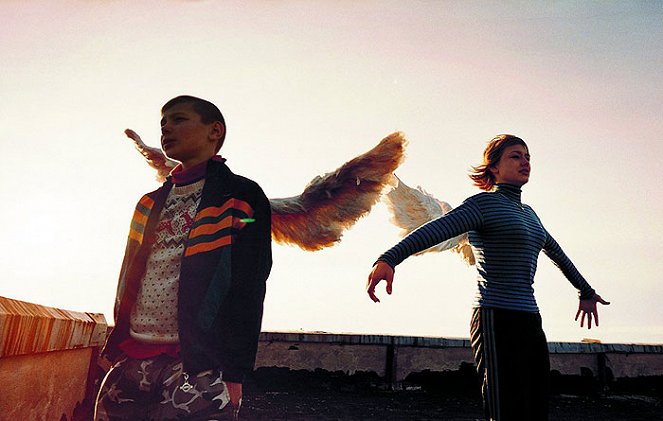Regie:
Lukas MoodyssonDrehbuch:
Lukas MoodyssonKamera:
Ulf BrantåsMusik:
Nathan LarsonBesetzung:
Oksana Akinshina, Arťom Bogucharskij, Tõnu Kark, Nikolai Bentsler, Madis Kalmet, Michael Merikan, Aleksander Okunev, Herardo Contreras, Tomasz Neuman (mehr)Streaming (3)
Inhalte(1)
Die sechzehnjährige Lilja lebt mit ihrer Mutter in einer heruntergekommenen Wohnsiedlung im postkommunistischen Russland und träumt von einem besseren Leben. Dieses scheint auch in greifbare Nähe zu rücken, als der neue Freund der Mutter, ein Exil-Russe, der in den USA lebt, beide mit nach Amerika nehmen will. Doch schon bald zerplatzt Liljas Traum, als die Mutter allein mit ihrem Freund aufbricht. Lilja bleibt nur das vage Versprechen, sie würde irgendwann nachgeholt werden. (Verleiher-Text)
(mehr)Kritiken (2)
Lilja 4-ever is a Swedish-Danish film set in Russia in a small town after the fall of socialism and follows the disturbing story of a 16-year-old girl who experiences a living hell and perhaps the worst possible fate a woman could ever face. As soon as she is left by her mother and her new boyfriend, her life goes downhill and she goes from one bad situation to another, and you as a viewer feel anxious, uncomfortable and sad all at the same time. A hopeless, disturbing, authentic, uncomfortable and very sad film (I had tears flowing at the end). The Scandinavians in full force, no one can present human trafficking as raw as them. I also see the music as a big plus, in the form of hits of the time like Rammsten and Nas ne dogonyat. 8.5/10.
()
Spoilers - Only people from the same social class can truly love each other. In the end, everyone in paradise will find their happiness, even the unhappy ones. The rich never really want to help us, the poor, and the sad existences. No, thanks, it's better this way. While at first I couldn't shake the feeling that the script was futilely aiming for authenticity and in its ultimate unfinishedness, it's almost laughable, on the other hand, I have to admit that when Andrei appeared on the scene, I realized that I really care about Lilya. However, this feeling is undermined by the fact that it's completely clear that not everything will work out, everyone will be cruel, and Lilya will be hurt many more times. The uncompromising nature of the lives of abandoned children can definitely be portrayed more vividly than with the help of a trivial image of "we can play together in the end." 50%
()

